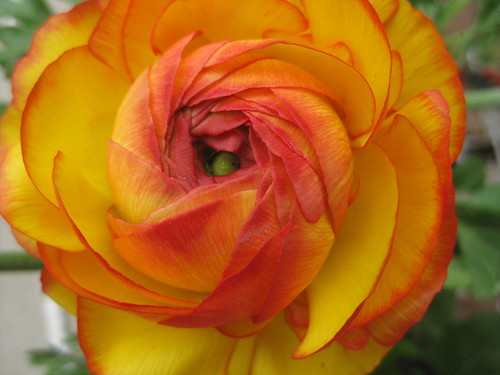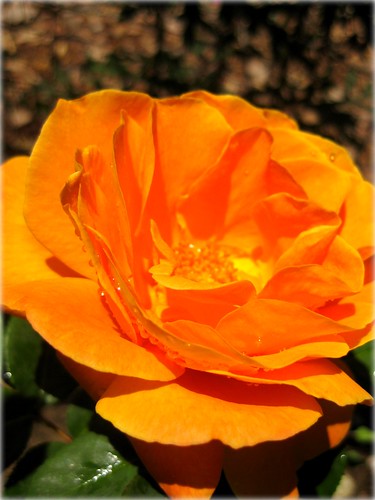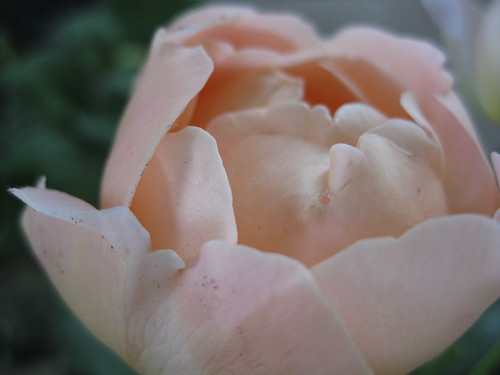This weekend I scraped off the tattered bumper stickers from our car (Another Family for Peace, Live Simply so Others May Simply Live, and Just Say YES to Equal Marriage Rights) and put on three new ones. One of them, “Question Authority,” was John’s first choice. The others: a large peace symbol and “Consume Less, Share More” were more of my choosing.
However I had a musing this morning that affirms the significance of the “Question Authority” slogan for me. As I was writing a comment on John’s post about the temple ceremony portrayal on the HBO show “Big Love,” I had a strong flashback of something that happened many years ago but almost made me cry as I recalled it today.
I’m not someone who has a strong tie to talismans, but I do find that certain items bring back a lot of memories. For example, I can tell you when and where I’ve acquired every item of furniture, or books, or the plants in my garden…I love the stories of “things” (which is probably why I love my chosen profession so much).
Many years ago John gave me a simple pair of earrings that had small white flowers dangling from them. I will emphasize the small part (I’d say there were about 4-5mm in diameter). Now those of you who’ve read my New Era story know that part of my affinity for flowers and gardens comes from a particular moment with my Dad when he gave me encouragement after my amputation surgery. So these small earrings that John gave me I wore to my Dad’s funeral and then every time after that it was in some small way linking me to my Dad and to that special moment that we shared. I took to wearing these earrings to the temple, given that they matched my white clothing nicely and because they reminded me of how special my Dad was to me and they represented my carrying his memory with me in a symbolic way. It seems silly now as I write this, but it was important to me at that time–I’d grieved so deeply when he died.
So one day when I was stepping out of the dressing room at the temple and going to the area to wait for the next endowment session a female temple worker stopped me and told me that my earrings were inappropriate and I would have to remove them before I could pass into the ordinance areas of the temple. I questioned her lightly about why and explained that I’d worn them frequently in the temple before. “No dangly earrings are allowed,” she said firmly.
I went back to my locker and curled up and cried as I took off the earrings. I don’t know what has happened to them since then and I don’t remember ever wearing them again.
So many things in my life have happened that are beyond my control…the loss of my leg, the loss of loved ones, and a lifetime of related health problems. And for much of my life I submitted the dictums of LDS authority, surrendering much of the control of my life to the sometimes-arbitrary though often-institutionalized leadership of the church. Perhaps this is why I have some ‘control issues‘ now. There’s a headiness to being able to chart my own course and decide what I will wear and when, or what I will drink, or where I will spend my Sunday mornings.
And today I put on these earrings before I even knew I’d be writing this post. They are reminding me of flowers, family, and how much some things change and how much some things stay the same.
UPDATE: As I was teasing back the layers of this memory while I ate lunch on my back porch (love the new table!!), I remembered one more very salient detail: the temple experience happened during a time when John did not hold a temple recommend (because of his loss of belief) and I was going to the temple alone. The earrings were a tie from me to him to my father (a man whom he had loved and respected so much). Again, such a small thing, but it’s funny to remember how badly I was already wounded then and I was struggling to find comfort in the smallest of object and rituals. Of course I didn’t stop being LDS because some stranger didn’t like my earrings. But I was so fragile then and it couldn’t help but contribute to my feelings of sorrow, of loss, of doubt, and of weariness with a tradition that no longer gave me the strength for my journey.




